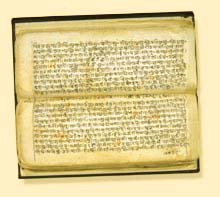Hinduism origins
 |
 |
 |
The Sanskrit Rig Veda, the earliest of the Vedic hymns, is one the world's oldest books |
The religion of India
Hinduism is the indigenous religion of India. It grew over thousands of years into a body of teaching and culture which we now call Hinduism, named after the Western word for India, formerly called Hind, the land on the other side of the Indus River. India’s own name for its religion is Sanatan Dharma which means the eternal occupation of the soul. Religion in India has always been a natural part of daily life: for the body the natural thing is to breathe and to eat, and for the soul the natural occupation is religion.
Early sources
Hinduism has no single founder. It evolved out of the rich culture of ancient India. Between 3000 and 1500 BC the Aryans migrated into India from present-day Iran. In Northern India they met a culture already well-established, with cities such as Mohenjo Daro in present-day Pakistan. In Southern India the Deccan culture flourished for 1500 years up to about 1000 BC. Early Hinduism developed out of these three cultures.
The Vedic hymns
The source of Hindu teaching is the Vedic hymns, poems passed down from ancient times by word of mouth, and written in the Sanskrit language in their earliest form around 1500 BC. Hindus believe the Vedas are the inspried word of God, delivered at the dawn of the universe to Brahma, the first created being. The central theme of these poems, expanded in other sacred writings, is the soul’s search for liberation from suffering, and ultimately for release from the cycle of birth and death.
|

